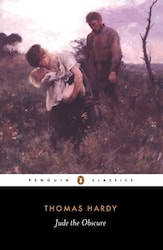
I’m no stranger to Thomas Hardy’s novels. His Tess of the d’Urbervilles is one of my all-time favorite novels. I’ve read The Mayor of Casterbridge, The Return of the Native, and not too long ago, I read Far From the Madding Crowd. Jude the Obscure is a quintessentially Hardy novel. It’s dark, tragic, and iconoclastic. In fact, Jude is such an affront to society that the Victorian reception of it was quite hostile As a result, Hardy swore off writing novels and devoted his remaining four decades primarily to poetry.
There are endless twists and turns among the six parts of this novel, beginning with Jude as a young child and carrying through the rest of his life. I won’t spoil the plot for you here, but there are several surprises and the predictable Hardy-esque tragedies along the way.
What so riled the Victorian audience is that Hardy attacks several sacred cows. First, the institution of marriage comes under his microscope. Hardy is arguing that a legal contract for marriage is the surest way to kill a relationship because of the compulsion it assumes. A second target for Hardy’s social commentary is religion overall. Jude gradually abandons his plan to enter the clergy, and then religion altogether, because he comes to see it as nothing more than hypocrisy and unnatural superstition. And third, Jude takes on the social classes, especially as it shows up in the university system, where only the monied and connected are admitted, and members of the working class are kept out, regardless of intellectual affinity or prowess.
All of that was too much for the Victorians, and Jude the Obscure came under vitriolic attack. Hardy said, fine, then no more novels for you!
Hardy’s a challenge to read, with often dense prose, the dialect of his Wessex characters, and many classical allusions that necessitate footnotes, but the prose in Jude is actually much more streamlined and direct than it is in his earlier novels. There’s a noticeable difference between the prose in Far From the Madding Crowd (his first major novel) and in Jude the Obscure.
It is clearly our loss that Hardy abandoned fiction. Imagine the novels another 30 years might have given us! Jude does not unseat Tess as my favorite Hardy novel, but it’s very good.
There are endless twists and turns among the six parts of this novel, beginning with Jude as a young child and carrying through the rest of his life. I won’t spoil the plot for you here, but there are several surprises and the predictable Hardy-esque tragedies along the way.
What so riled the Victorian audience is that Hardy attacks several sacred cows. First, the institution of marriage comes under his microscope. Hardy is arguing that a legal contract for marriage is the surest way to kill a relationship because of the compulsion it assumes. A second target for Hardy’s social commentary is religion overall. Jude gradually abandons his plan to enter the clergy, and then religion altogether, because he comes to see it as nothing more than hypocrisy and unnatural superstition. And third, Jude takes on the social classes, especially as it shows up in the university system, where only the monied and connected are admitted, and members of the working class are kept out, regardless of intellectual affinity or prowess.
All of that was too much for the Victorians, and Jude the Obscure came under vitriolic attack. Hardy said, fine, then no more novels for you!
Hardy’s a challenge to read, with often dense prose, the dialect of his Wessex characters, and many classical allusions that necessitate footnotes, but the prose in Jude is actually much more streamlined and direct than it is in his earlier novels. There’s a noticeable difference between the prose in Far From the Madding Crowd (his first major novel) and in Jude the Obscure.
It is clearly our loss that Hardy abandoned fiction. Imagine the novels another 30 years might have given us! Jude does not unseat Tess as my favorite Hardy novel, but it’s very good.
 RSS Feed
RSS Feed
